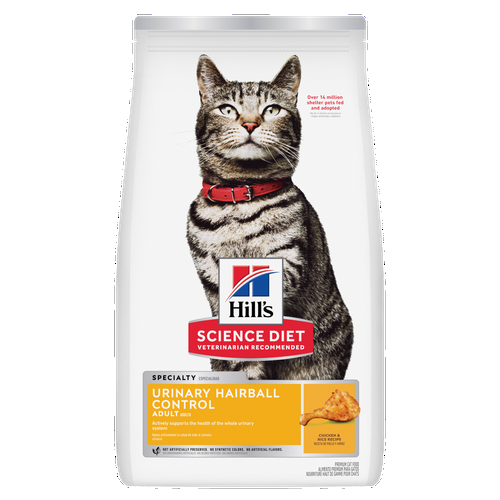
-
Find the right food for your petTake this quiz to see which food may be the best for your furry friend.Find the right food for your petTake this quiz to see which food may be the best for your furry friend.Featured products
 Adult Small & Mini Lamb Meal & Brown Rice Recipe Dog Food
Adult Small & Mini Lamb Meal & Brown Rice Recipe Dog FoodFor the faster metabolism of Small & Mini dogs
Shop Now Adult 7+ Small & Mini Chicken & Brown Rice Recipe Dog Food
Adult 7+ Small & Mini Chicken & Brown Rice Recipe Dog FoodFor the unique nutritional needs of mature Small & Mini dogs
Shop Now Hill's Science Diet Adult Oral Care Chicken, Brown Rice & Barley Recipe Dog Food
Hill's Science Diet Adult Oral Care Chicken, Brown Rice & Barley Recipe Dog FoodClinically proven kibble technology to reduce plaque & tartar build-up
Shop NowFeatured products Adult Indoor Chicken Recipe Cat Food
Adult Indoor Chicken Recipe Cat FoodSupports energy level and beautiful fur in indoor cats
Shop Now Hill's Science Diet Adult Sensitive Stomach & Skin Dog Food
Hill's Science Diet Adult Sensitive Stomach & Skin Dog FoodHighly digestible recipe, gentle on stomachs. Nourishes skin & promotes a lustrous coat
Shop Now Adult Urinary Hairball Control Chicken & Rice Recipe Cat Food
Adult Urinary Hairball Control Chicken & Rice Recipe Cat FoodActively supports the health of the whole urinary system
Shop Now -
Featured articles
 15 Pet-Friendly Cities Ideal for a US Road Trip
15 Pet-Friendly Cities Ideal for a US Road TripCheck out our list of pet-friendly U.S. cities that are excellent travel options, offering off-leash dog parks and pet-friendly restaurants & hotels.
Read More Easy DIY Dog & Cat Toys: Nine of Our Favorites
Easy DIY Dog & Cat Toys: Nine of Our FavoritesBrowse this comprehensive guide for several of our favorite DIY dog and cat toys that are sure to put a little pep in your pet's step.
Read More My Pet Ate a Lizard — What Should I Do?
My Pet Ate a Lizard — What Should I Do?Learn what to do if your pet eats a lizard, including whether they can be toxic and symptoms to keep an eye on when they've swallowed one.
Read More -


As a pet parent, you want to do all you can to make sure your dog lives a long, healthy life. Have you ever wondered if your four-legged companion needs dog vitamins to be healthy? Before you decide whether or not your dog should take vitamins, you need to know the nutritional essentials all dogs need.
Start Strong With Nutritious Food
Browsing the vitamin shelf at the pharmacy for your own health can be confusing, and making sense of dog supplements can be just as mind-boggling. So where do you start? The first place you need to look is in your dog's bowl. Good nutrition starts with what you feed your pet every day. That may sound simple, but with so many dog foods on the market, it can be overwhelming to figure out which one is right for your furry friend. Fortunately, with a little bit of knowledge about essential nutrients and dog vitamins, you can feel less overwhelmed when it comes to providing your pet with everything he needs to thrive.
Your dog needs six essential classes of nutrients to live a healthy lifestyle: water, protein, fats, carbohydrates, vitamins and minerals. However, each individual dog may require more or less of some of those essentials. Fully understanding your dog's nutritional requirements, his activity level, age, health problems and any typical genetic issues will help you look for food that meets his individual needs.
The next step is to discuss food recommendations with your veterinarian. Only through regular checkups can your vet determine if the food you are feeding your pup is providing him with the essential nutrients he needs. If your vet does feel that your dog needs additional nutrients, they will either prescribe a prescription dog food or give you a prescription for dog supplements.

Examples of Dog Vitamins
Sometimes food alone will not meet all your dog's health requirements. If your vet does recommend a supplement or vitamin, don't be too alarmed. According to the American Kennel Club, one of the most common dog supplements, glucosamine, is used to treat joint problems in dogs. Glucosamine is a compound naturally found in the fluid around joints and can help alleviate arthritis pain in a dog. Your vet might also recommend fish oil capsules for an older dog with skin allergies, or antioxidant vitamin A treats for a pup with inflammation issues. Make sure you and your vet discuss the pros and cons of using vitamins and develop a plan that best meets the needs of your particular dog.
You should never give your dog human vitamins, or even over-the-counter dog vitamins or supplements. Be sure to follow your vet's directions on how much and how often to give the pills, treats or capsules prescribed to you. If you run out of prescribed vitamins for your pup, get more from your vet, not your local human drugstore. A human vitamin E tablet is not the same as a dosage for dogs.


Tasty Tips
Specific Reasons to Supplement
When you have a dog with special medical needs, supplements or vitamins can be great ways to help your dog live a happy, healthy and active lifestyle. Most dogs don't need supplements until they are much older, but some dogs may require supplements from an early age due to different genetics.
It is also important to not give extra vitamins with the thought that you are creating a super healthy dog. Vitamin D, for example, can have great health benefits, but it can also be deadly if given improperly. Just because your neighbor swears by a certain supplement for their furry friend doesn't mean the supplement will have the same effect on your dog.
Consider His Condition
Every breed and every dog is unique, and what is best for one isn't always best for another. Even if you are feeding your dog food that meets all his essential nutrient needs, environmental factors can contribute to the need for additional dog vitamins or supplements at different points in a dog's life. Since dogs have different needs at different stages, it is important to monitor your dog's appearance, behavior and activity levels at all times. If something changes, even something minor, talk with your vet to see if a nutrient deficiency could be the cause of the change. Most of the time a change in food is all it takes to bounce back.
Dogs don't have nine lives, so it's important to give them the best life you can. Feeding your pup a well-balanced food that contains all six essential nutrients in the right proportions is key. Regular checkups with the vet will help you determine when and if supplements are needed. Again, don't rely on recommendations from friends or the internet to decide what vitamins your dog needs — your vet knows best.


Chrissie Klinger is an educator, writer and mother of two children, three dogs and three cats. Her dog Jake loves sitting on her lap every chance he gets! She enjoys living an active and eco-friendly lifestyle in rural Pennsylvania.
Related products

Improves everyday ability to get up & go

For the faster metabolism of Small & Mini dogs

For the unique nutritional needs of mature Small & Mini dogs

Clinically proven kibble technology to reduce plaque & tartar build-up
Related articles

Understand the role that Omega-6 and Omega-3 fatty acids play in your dog's overall health, and how you can ensure they are getting enough.

Discover how the field of dog science is giving us more and more insights into the inner workings of our furry best friends.

Your dog's coat and skin are a big part of your dog's overall health. Ensure you keep your dog's coat healthy, by following these simple tips.

Learn basic steps & precautions for treating a cut on your dog, including what you can put on the cut, and when you should take them to the vet.

Put your dog on a diet without them knowing
Our low calorie formula helps you control your dog's weight. It's packed with high-quality protein for building lean muscles, and made with purposeful ingredients for a flavorful, nutritious meal. Clinically proven antioxidants, Vitamin C+E, help promote a healthy immune system.
Put your dog on a diet without them knowing
Our low calorie formula helps you control your dog's weight. It's packed with high-quality protein for building lean muscles, and made with purposeful ingredients for a flavorful, nutritious meal. Clinically proven antioxidants, Vitamin C+E, help promote a healthy immune system.

